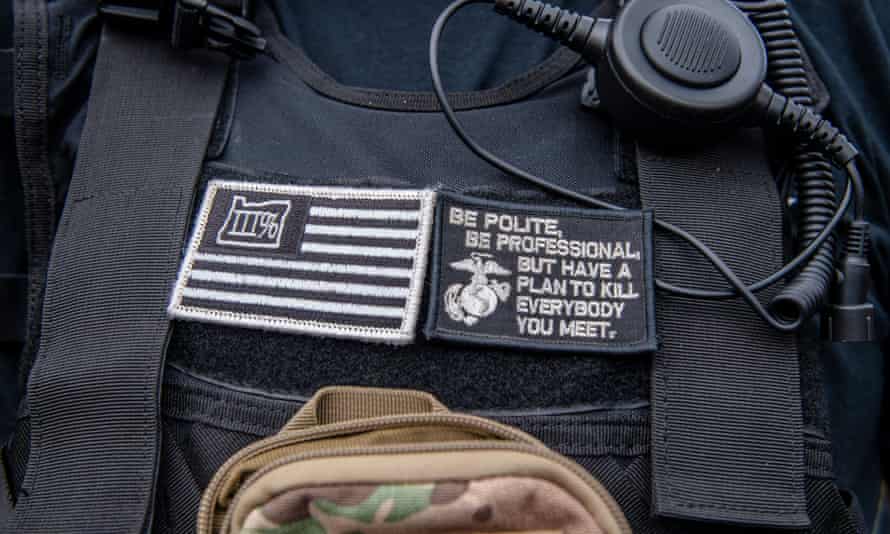US militia group draws members from military and police, website leak shows
Analysis: Membership list of American Patriots Three Percent also shows widespread network of people from variety of occupations
A Guardian investigation of a website leak from the American Patriots Three Percent shows the anti-government militia group have recruited a network across the United States that includes current and former military members, police and border patrol agents.
But the leak also demonstrates how the radical group has recruited from a broad swath of Americans, not just military and law enforcement. Members include both men and women, of ages ranging from their 20s to their 70s, doing jobs from medical physics to dental hygiene and living in all parts of the country.
Experts say the revelations of the broad scope of the movement’s membership shows the mainstreaming of the radical politics of militia and so-called “Patriot Movement” groups during the Trump era and beyond.
There has been a particular focus on the militia movement after the 6 January attack on the Capitol in Washington DC, in which a rampaging pro-Trump mob included militia members and others from far-right organizations.
According to members who spoke to the Guardian, the website from which the list was leaked was set up by national leaders of Patriot Movement group, which is affiliated with the broader Three Percenter movement.
Names, phone numbers and even photographs of members were obtained by activists who then posted the data to an internet archiving site, and the Guardian cross-referenced these with public records and other published materials.
One of the activists who discovered the leak, whose name has been withheld due to safety concerns, said that the Wordpress site’s poorly configured membership plugin left those details exposed to public view. Additional materials seen by the Guardian confirm that claim, and show that the materials were obtained by a simple search technique.
Many of the members revealed by the leak have extensive armed forces experience, including some who are still serving in branches of the US military.
Master Sergeant Andrew Holloway Selph performs quality assurance on fighter jets for the US air force in Hill air force Base, near Ogden, Utah, and is a 20-year service veteran. On 16 February, the Daily Dot reported that Selph had been nominated as a Utah contact for the Oath Keepers, another far-right Patriot Movement group which has been implicated in the organization of the Capitol riot.
The group also has retired soldiers, including Scott Seddon, who founded the group in 2009 as one of a number of Three Percent groups that arose in the wake of the election of President Barack Obama. In 2018, he told journalist, Chris Hedges that he had done so “out of fear”.
Several other members of the group are current or serving police or military officers, including a reserve deputy police constable in Texas with a long police and US air force career behind him.
Meanwhile, Phillip Whitehead, 61, of Prescott Valley, Arizona, is the commander of that city’s American Legion post. In his bio on that site he boasts of six years’ military service in the 1980s, and then 34 years in law enforcement including stints in the Tucson police department, Yavapai county sheriff’s office, and the US border patrol.

In a telephone conversation, Whitehead blamed national leaders of AP3% for breaching members’ privacy. Describing his role as “sergeant at arms and zone commander” in the Arizona AP3%, he said he was “appalled that information attached to individuals” had been leaked from the site.
He explained that he had not specifically entered his own details on the site, and his understanding was that the information had been collected from state-level organizations to be stored in a “member-only database” which would serve as “a way to contact the organization and perhaps as a recruitment tool”.
Whitehead’s claims that he did not specifically provide information to the website matched the response of a serving US army non-commissioned officer who, when contacted by the Guardian, said that he had only attended one “meet and greet” several years before, and could not explain how his contact details came to be added to the website.
“A lot of us are former military, former law enforcement,” Whitehead said of the leak. “Some of us have had high level security clearance. This has put myself and my family at risk.”
Whitehead insisted that the group was “not a militia” and the goal as he understood it was to act as “community protectors at the request of local authorities”. Beyond the “distress” caused by the website, Whitehead criticized Sneddon, the national leader, for his “outbursts in a public forum, Facebook”, adding that “I don’t like his public behavior because I don’t think that’s what the organization should stand for.”
Devin Burghart is vice-president of the Institute for Research and Education on Human Rights (IREHR), which tracks far-right militants including the militia movement.
In a telephone conversation, Burghart said that AP3% were “one of the early attempts to build out a national network of Three Percent groups”, and that “they were successful early on in using Facebook for recruitment”.
He said that while AP3% “definitely have a far-right paramilitary structure and ideology”, they were “far more focused on action than they are on ideology”, and have in the past done extensive live fire drills and acted as vigilante security guards during protests, including recent Black Lives Matter protests around the country.
Burghart said that “military veterans involved in far-right paramilitary groups are not just betraying their oaths, they are threatening American democracy and national security”, adding that “there is a staggeringly long list of far-rightist veterans trained in the use of lethal force overseas who turned those techniques on Americans back home in pursuit of political aims.”
Not all of the members have experience in the armed forces or law enforcement, and many do workaday jobs. Members investigated by the Guardian include dental hygienists, Apple Geniuses and beekeepers.
Others work in advanced or specialized fields. John P Balog, of Rome, New York, has a PhD in medical physics and advertises a consultancy advising on radiation therapy for cancer patients.
Dr Balog was another AP3% member who responded to requests for comment on the website leak.

After emailing and calling on a protected number, Balog described the group as a “secret society”, and said that the website had been in existence for several years.
Asked why secrecy was necessary, Balog said that “honestly because most of the country doesn’t share our values”, which he characterized as “hardcore conservatism”.
Other members of the site have a documented history of joining online forums for similar groups. Data provided to the Guardian by IREHR indicates that many were members of a wide range of militia-related groups on Facebook before that company began reining in such organizing on its website.
Seth Weiner, 34, of Canton, New York, who is also the administrator of a Facebook group for collectors of German Iron Cross military medals, was a member of seven militia-related Facebook groups including “Q Patriots”, “Pissed Off Patriots of America”, and “Red Pilled Patriots”.
Brian Plescher, of Ottawa, Ohio, was a member of nine such groups on Facebook, including one attached to Ohio Militiamen, the Continental Militia Network and “APIII American Patriot the III%, Old School”, the Facebook group that once served as AP3%’s online hub. Jennifer Delane Hinson, a dental assistant in Pontotoc, Mississippi, was also a member of the AP3% Facebook group, along with groups like the “Mississippi Minute Man Militia” and “III% Militia national Contingency”, all under the alias, Jenny Plunk.
Members of the group are not concentrated in any region of the United States, but there are unusual levels of membership in some states and counties, including some outside the Patriot Movement’s heartlands in the midwest, south and west of the country.
New York state, for example, is home to 53 of the signed-up Three Percenters – more than 11% of the total members on the site – and 17 members are resident in and around Saint Lawrence county, in the state’s far north on the Canadian border.
While the leak disclosed the details of about 500 members, Burghart said the total national membership was probably “somewhere in the low thousands”.
The site is no longer online, and visiting the URL returns a page which says “this account has been suspended”. Internet records indicate that they abruptly lost hosting around 2 February, just after the leak was discovered. Their former hosts, wix.com, did not immediately respond to requests for comment.
AP3% made news in January when pictures emerged of Colorado members posing with the controversial Colorado congresswoman Lauren Bobert on the steps of that state’s capitol.




